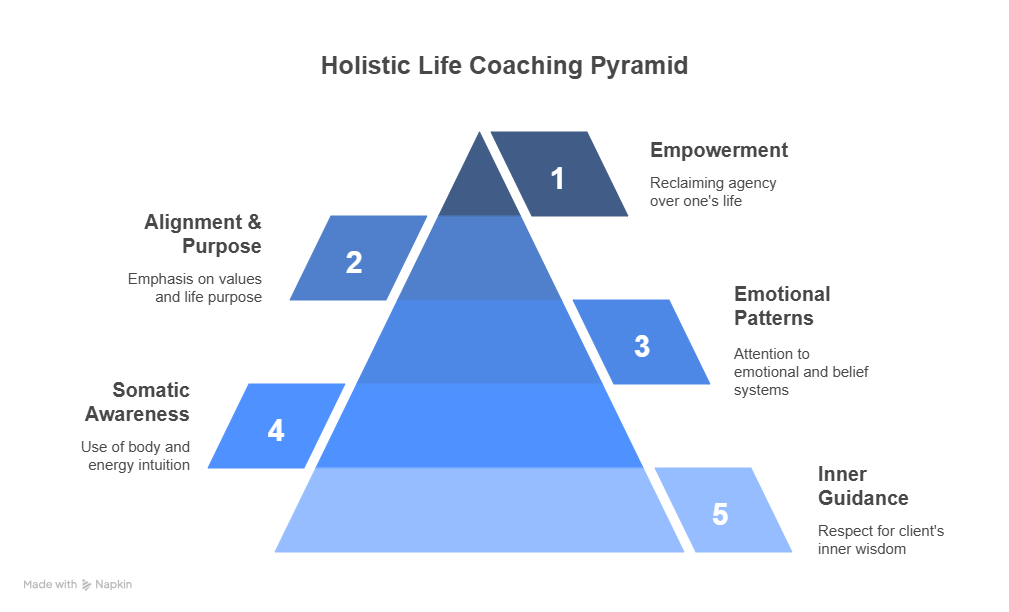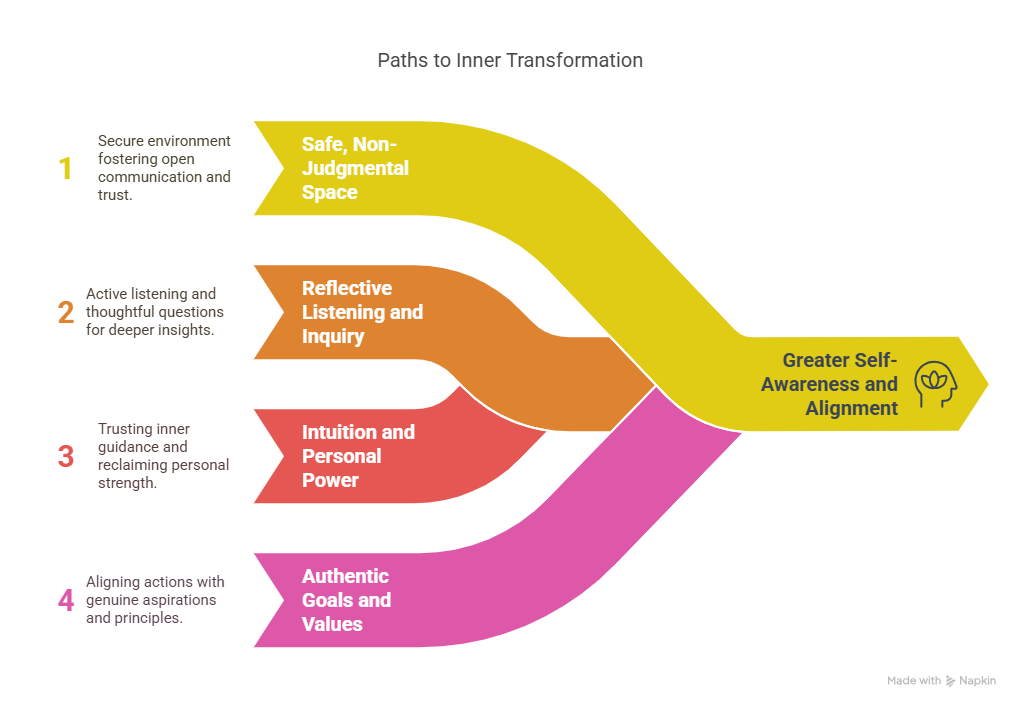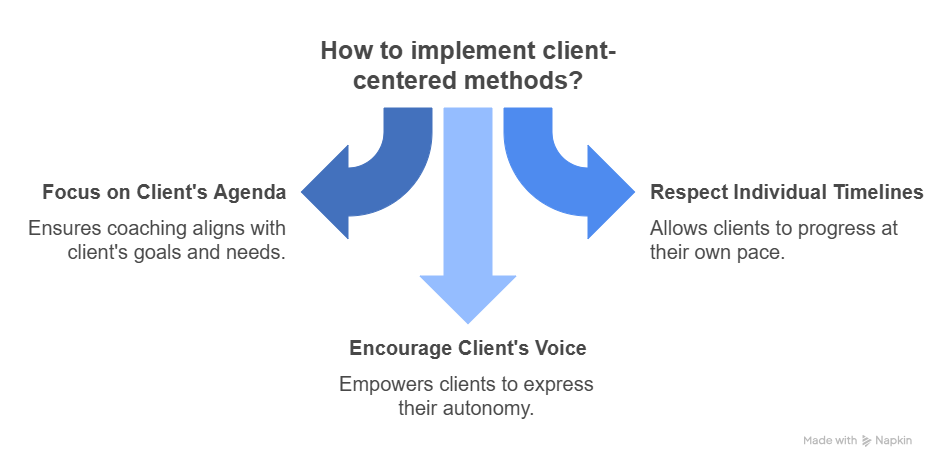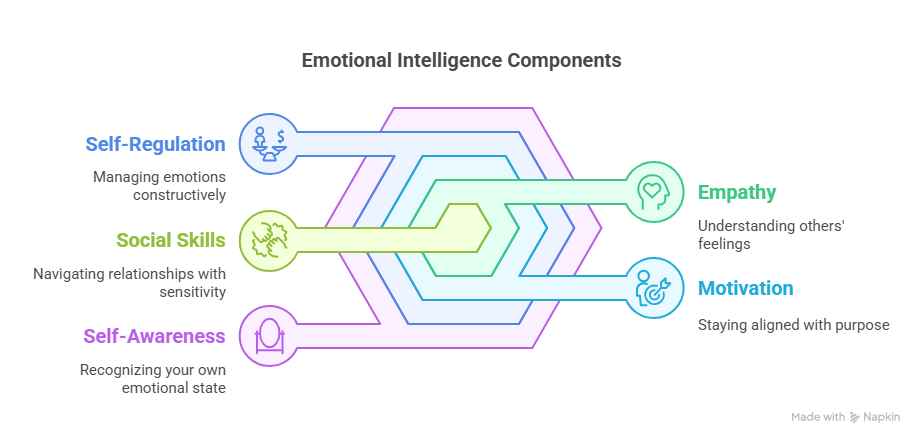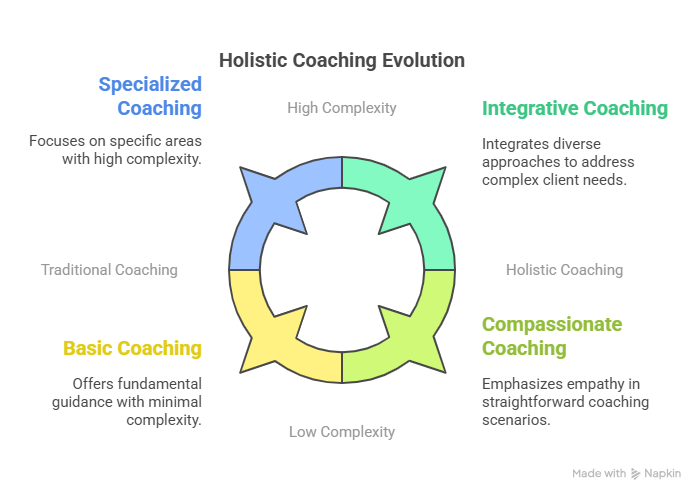Foundation for Holistic Life Coaching: Core Principles & Ethics
The foundation for holistic life coaching extends beyond mere methodologies; it represents a conscious way of guiding personal transformation. Built upon principles of self-awareness, ethics, emotional intelligence, and energetic alignment, holistic coaching promotes a deep, integrative change that addresses all aspects of the human experience. This article offers a complete educational guide for aspiring and certified coaches alike, exploring the values, tools, and structures that ground successful holistic coaching practices.
Whether you're beginning your journey toward certification or expanding your current approach, understanding the foundation for holistic life coaching is crucial to developing a practice that is not only effective but deeply fulfilling.
Understanding Holistic Life Coaching
At its core, holistic life coaching is a client-centered methodology that views individuals as whole beings—comprised of mind, body, emotions, and spirit. Rather than focusing solely on goal achievement or performance, it facilitates transformation by integrating all aspects of the self.
Holistic coaches help clients navigate challenges, align with their purpose, and unlock inner wisdom using techniques grounded in mindfulness, energy work, emotional intelligence, and conscious communication. This comprehensive approach supports sustainable growth, fostering change from the inside out.
Key aspects include:
A deep respect for the client’s inner guidance
Use of somatic awareness and energetic intuition
Attention to emotional patterns and subconscious beliefs
Emphasis on alignment, purpose, and values
Holistic life coaching empowers clients to reclaim agency over their lives in a grounded, embodied way.
Related Blog: The Ultimate Guide to Holistic Life Coach Certification in 2025
The Philosophy of Holistic Coaching
Coaching as a Sacred Partnership
Holistic coaching is a collaborative and co-creative partnership. Unlike traditional therapeutic models that position the coach as the expert, holistic coaching honors the client as the expert of their own life.
The coach's role is to:
Hold a safe, non-judgmental space
Facilitate awareness through reflective listening and inquiry
Support clients in discovering their truth
This model is built on the belief that individuals are naturally creative, resourceful, and whole. The coach is not here to "fix" the client but to help illuminate paths to greater self-awareness and alignment.
Transformation from the Inside Out
Instead of imposing change externally, holistic coaching focuses on helping clients connect to their inner wisdom. It guides them through a process of self-inquiry, self-discovery, and self-empowerment. Clients learn to:
Trust their intuition
Reclaim personal power
Align with authentic goals and values
The result is transformation that is not only effective but deeply rooted.
Related Blog: What to Look for in the Best Holistic Life Coach Certification Programs
The Core Principles of Holistic Coaching
The principles of coaching form the bedrock of any successful coaching relationship. In a holistic context, these principles are expanded to include emotional, energetic, and spiritual dimensions.
1. Presence
The power of presence cannot be overstated. A coach who is fully present invites the client into a deeper experience of themselves. Presence involves:
Mindful attention
Non-reactivity
Being grounded in the moment
When coaches are present, they create a container for insight, healing, and authentic dialogue.
2. Trust and Safety
Trust is the cornerstone of transformation. Clients must feel emotionally and energetically safe in order to explore vulnerability. Coaches cultivate trust by:
Practicing radical acceptance
Honoring confidentiality
Upholding ethical boundaries
3. Empowerment
A core tenet of holistic coaching is empowerment. The coach’s role is to help clients connect to their inner power, not become dependent on the coach. Empowerment techniques include:
Mirroring strengths
Encouraging self-trust
Facilitating inner guidance
4. Wholeness
Holistic coaches view the client as inherently whole. This means that healing and transformation are not about fixing, but about remembering and realigning with one’s innate wisdom and truth.
5. Client-Centered Methods
Holistic life coaching is fundamentally client-centered. This approach:
Focuses on the client’s agenda
Respects individual timelines and processes
Encourages the client’s voice and autonomy
The client is always in the driver’s seat of their own journey.
Related Blog: How to Become a Holistic Life Coach: A Step-by-Step Roadmap
Emotional Intelligence in Coaching
The Role of Emotional Intelligence
Emotional intelligence (EI) is the coach’s ability to perceive, understand, and manage emotions in both themselves and their clients. It is a vital competency that underpins every successful coaching session.
EI enhances the coach’s capacity to:
Navigate emotional blocks and defenses
Support emotional processing
Recognize subtle cues and undercurrents
The Five Components of EI
Self-Awareness: Recognizing your own emotional state
Self-Regulation: Managing emotions constructively
Motivation: Staying aligned with purpose
Empathy: Understanding others’ feelings and perspectives
Social Skills: Navigating relationships with sensitivity
When these elements are developed, coaches can create emotionally intelligent spaces that support transformation.
Related Blog: Accredited vs Non-Accredited Holistic Life Coach Certifications: What’s the Difference?
Ethical Foundations of Holistic Coaching
Ethics: The Backbone of Integrity
Ethics in holistic coaching are more than formal guidelines—they are the embodiment of integrity. A strong ethical framework fosters safety, professionalism, and trust.
Key Ethical Principles:
Confidentiality: Information shared is sacred
Consent: Clients are fully informed and autonomous
Cultural Competency: Respect for diversity
Non-maleficence: Do no harm
Professional Boundaries: Maintaining clear, healthy roles
These ethics are not just checkboxes; they reflect the coach’s deep respect for the client’s sovereignty.
Integrating Energy Work and Intuition
Energy work is a subtle yet powerful component of holistic coaching. It supports clients in accessing deeper truths, releasing blocks, and aligning their energetic bodies with their intentions.
Types of Energy Practices in Coaching:
Grounding and breathwork
Visualization and guided imagery
Chakra balancing
Somatic awareness and body scanning
These practices help regulate the nervous system, enhance presence, and support emotional release.
Using Intuition as a Coaching Tool
Developing intuitive listening allows coaches to:
Perceive what is unsaid
Ask transformative questions
Offer reflective feedback from a deeper place of knowing
Self-Development: The Inner Work of the Coach
Great coaches do their own inner work. The journey of the coach is just as important as the methods they use.
Pillars of Coach Development:
Shadow work: Examining projections and biases
Inner child healing: Building empathy and understanding
Embodiment practices: Staying grounded and clear
Continuous education: Staying current with techniques and trends
The more self-aware and evolved the coach, the more potent their impact.
Related Blog: 7 Best Holistic Life Coaching Courses Online
How the Foundation Supports Certification Success
Certification programs for holistic life coaching often assess more than knowledge. They look for embodiment, ethical maturity, and emotional presence.
Key Success Factors for Certification:
Embodied Principles: Living the values of the profession
Demonstrated Emotional Intelligence: Managing interpersonal dynamics
Mastery of Client-Centered Techniques: Active listening, inquiry, and reflection
Clarity of Ethics and Boundaries: Consistency and integrity
Programs aligned with these foundations prepare coaches for long-term success in the industry.
The Future of Holistic Coaching
The coaching industry is rapidly evolving. More clients are seeking integrative and intuitive approaches that honor all facets of who they are. Coaches equipped with emotional intelligence, energy awareness, and ethical grounding are leading the way.
As society becomes more complex, coaches are called to:
Be more compassionate
Create inclusive spaces
Guide with spiritual maturity
Holistic life coaching is not a trend—it’s a movement toward conscious living and empowered leadership.
Final Reflections
The foundation for holistic life coaching is both a map and a mirror. It offers guidance on how to structure a transformative coaching practice while inviting deep personal reflection.
By grounding yourself in core principles, emotional intelligence, ethics, and energy awareness, you not only grow as a coach but evolve as a human being. This is the heart of true holistic transformation. Let your foundation be strong, so that the work you build on it uplifts every life it touches.
ANHCO has built on the core principles of holistic coaching—emotional intelligence, ethics, and client-centered transformation. Designed for aspiring coaches who want to make a meaningful impact, this program blends science-backed techniques with intuitive practices. You'll learn how to guide others through personal growth, wellness, and aligned living. With expert mentorship and practical tools, you'll graduate fully equipped to launch your coaching practice. Ready to become a certified holistic coach? Enroll now in the ANHCo Health Coach Certification program!
FAQS
-
The foundation for holistic life coaching includes core principles like emotional intelligence, ethical integrity, energetic alignment, and client-centered methods. It serves as the philosophical and practical base from which coaches support clients in achieving deep, lasting transformation.
-
Holistic life coaching takes a whole-person approach—addressing mind, body, emotions, and spirit—whereas traditional coaching often focuses on goal-setting or performance. Holistic coaches integrate intuition, energy work, and emotional intelligence to support inner alignment and sustainable change.
-
The key principles of coaching in a holistic context include presence, trust and safety, empowerment, wholeness, and client-centered methods. These principles guide the coach-client relationship and shape the transformative experience.
-
Emotional intelligence allows coaches to recognize, manage, and respond to emotions—both their own and their clients'. It supports deep listening, empathy, and relational trust, which are essential in creating a space for personal breakthroughs and emotional healing.
-
Holistic coaches follow ethical principles such as confidentiality, informed consent, cultural respect, non-maleficence, and clear professional boundaries. These ethics ensure client safety, trust, and accountability throughout the coaching process.
-
Energy work and intuition help holistic coaches sense subtle shifts, release emotional blocks, and facilitate deeper insights. Techniques such as breathwork, chakra balancing, and intuitive listening are used to align the client’s inner energy with their personal goals.


